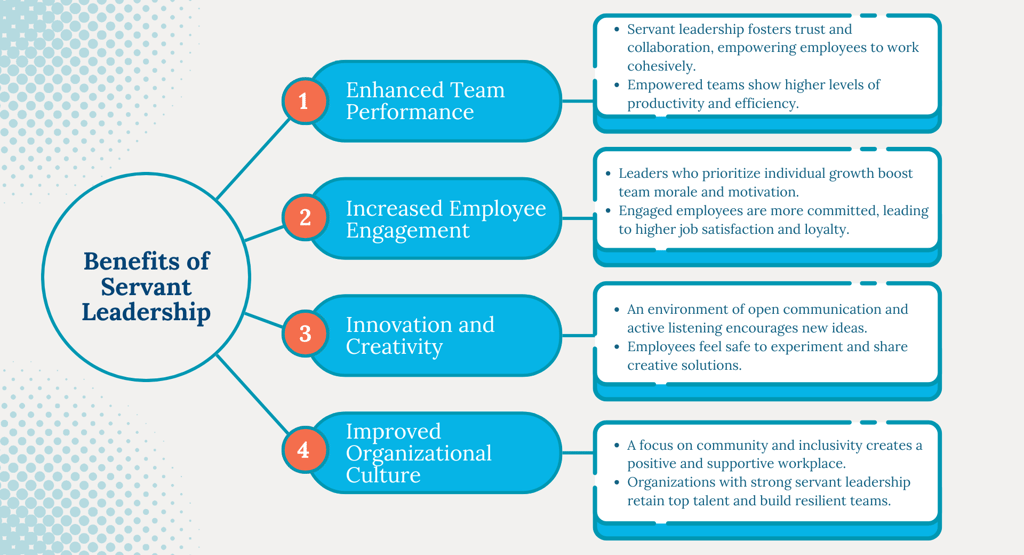The Servant Leadership Advantage: Empower Your Team, Empower Your Business
Empathy, trust, and community: servant leadership isn’t just a philosophy, it’s a roadmap to success. This article reveals the steps to lead with purpose and empower your team.
PROJECT TEAMS
Iyanna Trimmingham
11/4/20243 min read


As you guide your team through the challenges of today’s business environment, have you ever paused to reflect on your leadership style? Do you operate as a traditional, top-down authority, or do you strive to uplift and empower those you lead? In an era marked by rapid change and the need for agility, the most successful leaders are rethinking their approach.
The age of authoritarian rule is fading, making way for a new leadership model that values empathy, trust, and collaboration: servant leadership. This transformative approach, introduced by Robert K. Greenleaf in the 1970s, centers on the idea that the most effective leaders prioritize the growth and well-being of their teams. By doing so, they create a thriving work environment where engagement, innovation, and performance flourish.
In this article, we’ll explore the foundational principles of servant leadership, reveal the profound impact it can have on your organization, and outline actionable strategies to integrate this philosophy into your leadership practice. Get ready to unlock the full potential of your team and lead with a purpose that drives long-lasting success.
What is Servant Leadership?
Definition and Origins: Servant leadership is a philosophy where leaders focus on serving their teams rather than exercising power over them. Robert K. Greenleaf, who coined the term in 1970, envisioned leaders who prioritize the needs and growth of their people, believing that when employees are nurtured, organizations flourish.
Core Characteristics: Servant leaders exhibit empathy, active listening, stewardship, and a dedication to the personal and professional development of their team members. Over time, this concept has evolved into a widely respected approach in various fields, from corporate environments to non-profit organizations.
The Core Principles of Servant Leadership
To understand servant leadership, it’s essential to grasp its fundamental principles:
Empathy: Understanding and sharing the feelings of team members to build deep connections and trust.
Listening: Actively and genuinely listening to the concerns and ideas of the team.
Healing: Providing support to help team members overcome both professional and personal challenges.
Awareness: Being self-aware and understanding team dynamics to make informed decisions.
Persuasion: Influencing others through dialogue and consensus rather than positional authority.
Conceptualization: Having a visionary outlook that goes beyond the immediate tasks to see the bigger picture.
Foresight: Anticipating outcomes and using past experiences to guide future decisions.
Stewardship: Taking responsibility for the well-being of the organization and its people.
Commitment to the Growth of People: Prioritizing continuous development and skill enhancement.
Building Community: Creating a sense of belonging and fostering a collaborative environment.
Benefits of Servant Leadership
Why should organizations adopt servant leadership? The benefits are significant and far-reaching:
Enhanced Team Performance: By fostering a supportive and collaborative environment, servant leaders inspire teams to perform at their best.
Increased Employee Engagement: When team members feel understood and appreciated, they are more committed and motivated, reducing turnover and increasing loyalty.
Innovation and Creativity: A culture of open communication encourages employees to share and develop creative solutions without fear of failure.
Improved Organizational Culture: Servant leadership creates an inclusive and positive work environment that attracts and retains top talent.
Servant Leadership in Practice
Companies like Starbucks and The Container Store have embraced servant leadership. By prioritizing employee satisfaction, they have not only achieved strong financial performance but also built a reputation for exceptional customer service.
Practical Tips for Leaders:
Start Small: Implement one-on-one listening sessions to understand your team's needs.
Promote Growth: Invest in training and mentorship programs to foster skill development.
Model the Way: Demonstrate servant leadership behaviors, such as active listening and removing obstacles, to set the tone for your team.
Overcoming Challenges: Some may perceive servant leadership as a lack of authority. Clear communication of goals and holding team members accountable can ensure that this style remains effective. Additionally, balancing individual and organizational needs requires thoughtful planning and alignment with company objectives.
Servant Leadership in Project Management
Servant leadership is particularly impactful in project management, where fostering collaboration and trust is vital:
Why It Matters for Project Managers: Complex projects often involve diverse teams working under pressure. Servant leadership helps maintain a positive and productive environment.
Empowering Teams: By removing obstacles and providing the necessary resources, project managers can enable their teams to excel.
Building Trust: Through transparency and consistent support, servant leaders build a foundation of trust that facilitates better communication and collaboration.
Conclusion
Servant leadership is a powerful approach that redefines the traditional notions of authority. By focusing on the growth and well-being of their teams, servant leaders drive innovation, engagement, and exceptional performance. We’ve explored the key principles that underpin this model, the tangible benefits it offers, and how to apply it effectively in your organization.
Ultimately, servant leadership is about more than just managing—it’s about inspiring and empowering others to reach their full potential. As you reflect on your leadership style, consider this: true leaders are remembered not for their authority but for the impact they make. Embrace servant leadership and lead in a way that transforms not only your team but your entire organization.
Are you ready to be the kind of leader who makes a lasting difference?

